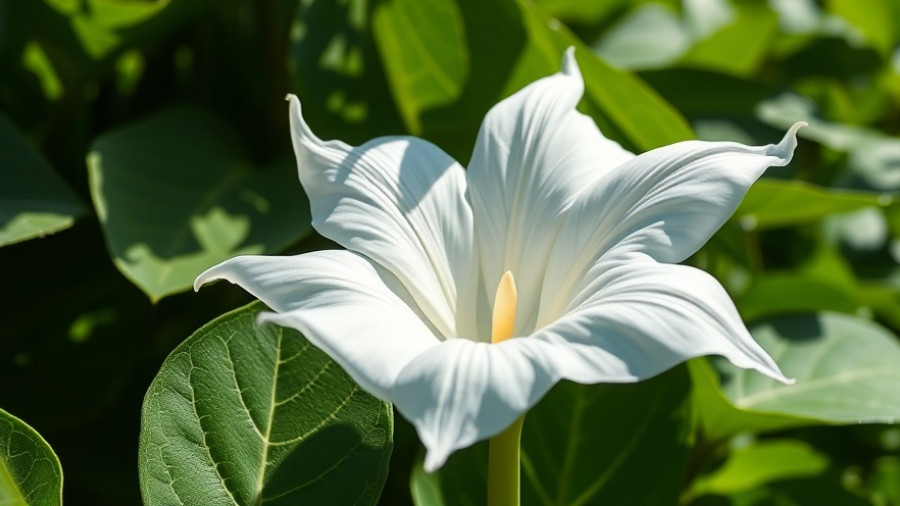
The Allure of Datura: A Perfect Halloween Plant
As autumn approaches and Halloween decorations begin to fill our neighborhoods, there's one plant that stands out for its eerie beauty: Datura. Commonly known as Devil's Trumpet, this enchanting plant blooms ethereal flowers that unfurl under the cover of night, releasing a sweet scent that draws in curious passersby. But beware! Datura is as beguiling as it is dangerous, with toxic properties that can lead to serious consequences.
Understanding the Mystique of Datura
Often found in gardens and public spaces, Datura's large, trumpet-shaped flowers are typically white or purple, adding a touch of the supernatural to any landscape. Their growth is remarkably resilient; thriving even in neglected conditions. Despite its tolerance to dry spells, Datura sneaks into the gardener's good graces, creating a dramatic visual impact known for captivating anyone who wanders by.
However, Datura’s beauty comes with a darker edge. The plant produces a range of tropane alkaloids, including atropine, hyoscyamine, and scopolamine, all of which can cause delirium or worse if ingested. The seeds are particularly concentrated with these toxins, which is why it’s dubbed devil’s weed.
Why Gardeners Should Approach With Caution
Due to its toxic nature, it's advisable for amateur gardeners to exercise caution when considering adding Datura to their flower beds. While some individuals might grow it solely for its beauty, the risk of accidental poisoning is a serious concern. The plant has been involved in numerous hospitalizations caused by unintentional ingestion or inappropriate use, often by those unaware of its dangerous effects.
Moreover, the intoxicating properties of Datura can create fascination, leading some to explore its psychoactive effects. However, such misadventures can quickly spiral into alarm when users are confronted with terrifying symptoms. The unpredictable potency of this plant means that its safety cannot be assured.Cultural Significance and Folklore Around Datura
Datura is steeped in folklore, often associated with both dark magic and healing properties. As highlighted in the witchcraft traditions, it is said to enhance power in spiritual practices, promoting visions and shamanic journeys. This duality—between beauty and danger—has given rise to a multitude of nicknames: from Hell’s Bells to Thornapple, each reflecting its mysterious dual nature in various cultural contexts.
In the realm of herbalism, practitioners have historically understood the plant's medicinal potentials, utilizing it as an anti-inflammatory or antispasmodic. Yet with all its promises, it is crucial to manage expectations and respect the potent nature of Datura. Those considering its use must do so with comprehensive knowledge and extreme caution.
Practical Tips for Enjoying Datura Safely
For those who wish to appreciate Datura’s haunting allure without undue risk, consider the following tips:
- Grow It with Care: If you opt to include Datura in your garden, position it away from play areas or where children and pets might roam freely.
- Avoid Consumption: Ensure that all family members are educated on the plant's toxic traits, reinforcing that no part of the plant should be ingested.
- Monitor Watering Needs: Although Datura can withstand drought, allowing for periodic watering can keep the plant healthy without making it reliant on constant upkeep.
- Learn About Alternatives: If you crave the striking appearance of Datura without its perilous qualities, consider planting more benign options like the moonflower or mock orange.
Final Thoughts on the Enigmatic Datura
Datura is indeed a botanical curiosity that captures attention with its intricate blooms and intoxicating scent. Its role in gardens invokes a sense of nostalgia, reminding us of long-ago Halloween nights shrouded in mystery. Yet, as charming as it may be, it demand respect due to its toxicity and potential for harm. Embrace its ethereal beauty, but remember the old adage: the most stunning flowers often carry the darkest secrets.
For those enchanted by the thrilling mix of beauty and danger, Datura may be one of your best choices this Halloween season. But heed the warnings associated with its charm; the risks may outweigh the aesthetic pleasure.
 Add Row
Add Row  Add
Add 




Write A Comment